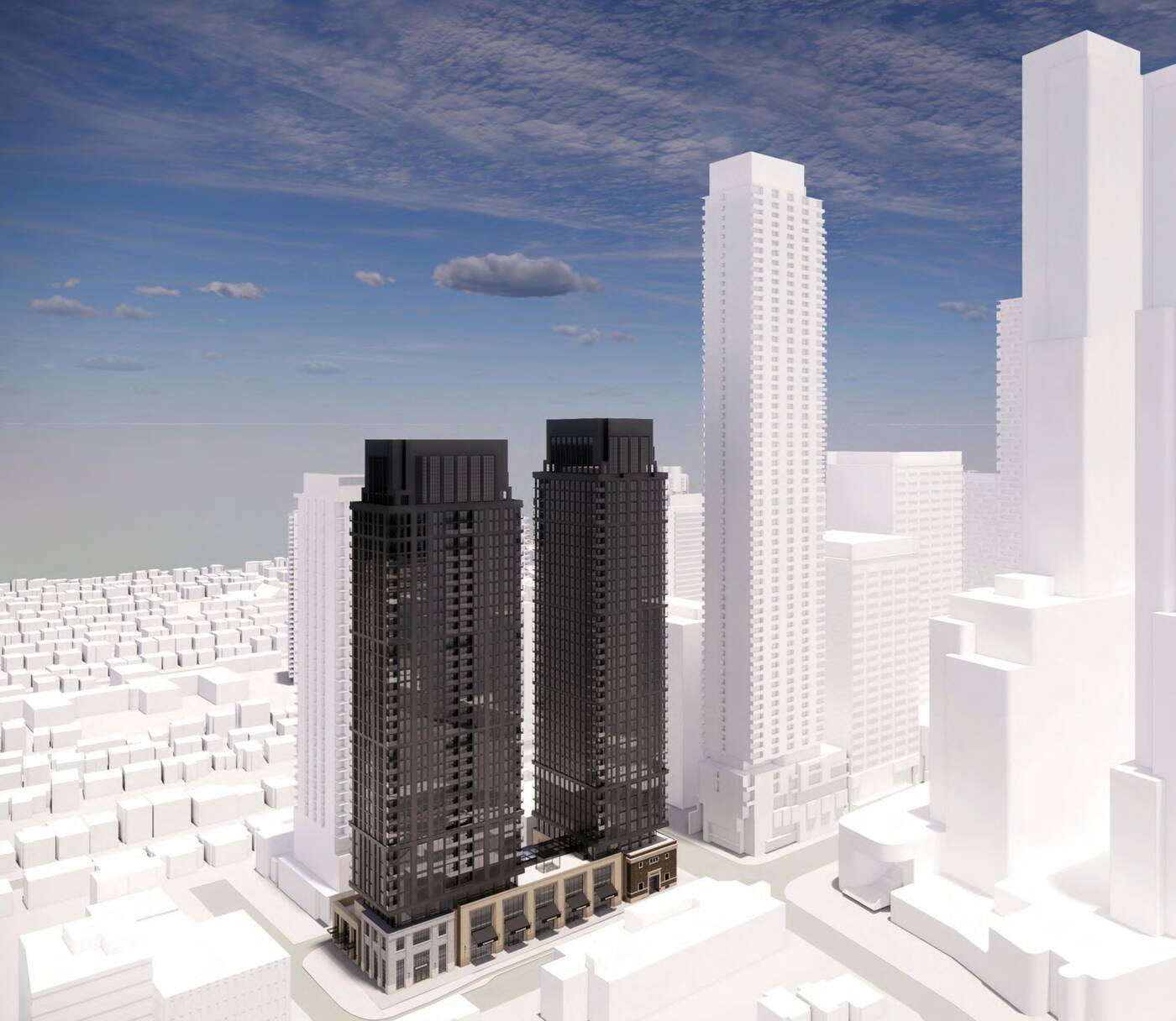Real eState
Morgan Stanley analysts are forecasting something ‘worse than in the Great Financial Crisis’ for commercial real estate
|
|


After the banking crisis, could the next domino be all those empty office buildings in your downtown? Investors and economists are sounding the alarm about the commercial real estate market, seeing trouble ahead with refinancing. This sector has been hit hard for years now with the shift to remote work bringing about rising vacancy rates and falling property values. For her part, Lisa Shalett, the chief investment officer for Morgan Stanley Wealth Management, and strategists, sees a “huge hurdle” ahead.
“We fear stresses in other asset classes will become another headwind for megacap tech stocks alongside those posed by a profits recession and/or economic recession,” Shalett wrote in the weekly Global Investment Committee note. And she had some frightening figures.
“More than 50% of the $2.9 trillion in commercial mortgages will need to be renegotiated in the next 24 months when new lending rates are likely to be up by 350 to 450 basis points,” Shalett writes. Alarmingly, Shalett notes that regional banks accounted for 70% to 80% of all new loan originations in the past cycle, with all eyes on the sector after the historic implosions of Silicon Valley Bank and Signature Bank last month. She said office properties were already facing “secular headwinds” from remote work, and she now sees a wipeout with vacancy rates close to a 20-year high: “MS & Co. analysts forecast a peak-to-trough CRE price decline of as much as 40%, worse than in the Great Financial Crisis.”
As Fortune has previously reported, tighter lending standards for the commercial real estate market are now likely. In fact, stricter lending standards were already in place with the Federal Reserve raising interest rates in its attempt to lower inflation, and the banking crisis will only exacerbate the existing lack of liquidity. That in turn will increase the risk of defaults, distress, and delinquencies, as the industry is largely built on debt, experts previously told Fortune.
Distress on this scale, Shalett says, will hurt landlords and the bankers who lend to them, trickling down to business communities, private capital funders, and owners of underlying securities. Nor will the tech and consumer discretionary sectors be “immune,” she says.
And what of the wider impact on the economy? While Shalett sees a soft landing still possible, she says the odds of that happening are decreasing in light of the likelihood of tighter lending standards. None other than Twitter and Tesla CEO Elon Musk seems to share this view, having recently tweeted that the state of the commercial real estate debt market is “by far the most serious looming issue.” But of course, he’s got his own troubles with office buildings that could be fueling his concern.





Real eState
Caution about Canada's private real estate sector abounds as valuations slow to adjust – The Globe and Mail


Valuations for Canada’s office real estate have taken longer to adjust than properties in other advanced economies.Jeff McIntosh/The Canadian Press
Sign up for the Globe Advisor weekly newsletter for professional financial advisors on our sign-up page. Get exclusive investment industry news and insights, the week’s top headlines, and what you and your clients need to know. For more from Globe Advisor, visit our homepage.
As the U.S. economy has pulled meaningfully ahead of Canada’s, so too has its private commercial real estate sector, which is adjusting more positively to the post-pandemic reality.
That’s particularly evident in both countries’ privately held office property markets. While the U.S.’s is well down the path of transforming, demolishing or otherwise ridding itself of empty office space, Canada’s has practically frozen in place following a wave of markdowns in 2023. That has made valuation assessments next to impossible.
“There’s a big dichotomy, and the Canadian market so far has not corrected,” says Victor Kuntzevitsky, portfolio manager with Stonehaven Private Counsel at Wellington-Altus Private Counsel Inc. in Aurora, Ont., which holds private real estate assets in credit and equity vehicles in both Canada and the U.S.
It’s no secret that last year was a difficult period for owners of Canadian private real estate, with many pension fund managers losing money as high interest rates drove up borrowing costs, inflation increased operating costs and vacancy rates remained high or even climbed.
The Caisse de dépôt et placement du Québec saw its real estate portfolio decline 6.2 per cent in 2023. The Ontario Teachers’ Pension Plan experienced a 5.9-per-cent loss in its real estate book, while markdowns on commercial properties owned by the Ontario Municipal Employees Retirement System (OMERS) resulted in its real estate portfolio dropping by 7.2 per cent.
However, there are pockets of strength investors can look to, says Colin Lynch, managing director and head of alternative investments at TD Asset Management Inc. These include multi-family residential and open-air retail centres, as well as industrial properties, which have been steady performers following strong gains through the pandemic.
It’s a view that dovetails with other analyses of the Canadian market. BMO Global Asset Management’s latest commercial property outlook notes that the industrial and multi-family segments remain strong due to high investor demand and tight supply.
“Office remains the asset class of the greatest near-term concern and focus,” the BMO GAM report states, estimating “a timeline for a return to ‘normal’ of a least five years.”
Mr. Lynch says while that timeframe could be accurate, private real estate investors need to evaluate opportunities on a city-by-city basis.
“Every city is very different. In fact, the smaller the city, the better the office property market has generally performed because commute times are much better, so in-office presence is much higher,” he says.
He points to cities such as Winnipeg, Regina and Saskatoon, where commute times can be 10 minutes and office workers are in four days a week on average.
However, there’s also room for more bad news, with some property owners struggling to refinance expensive debt in a higher-for-longer rate environment that could force firesales for lower-quality buildings.
The U.S. and other advanced real estate markets, such as the U.K., are “quarters ahead” of where the Canadian office market is in terms of valuation adjustments, Mr. Lynch says. A major reason is much of Canada’s commercial office real estate is owned by a relatively small group of large investment funds.
“Peak to trough in the U.K., for example, declines were about 20 per cent,” he says, noting that Canada’s market hasn’t corrected to that extent, but it is catching up.
Mr. Kuntzevitsky says these private fund assets are valued based on activity.
“The U.S. market is deeper, there’s more activity within it compared to Canada,” he says. “The auditors I speak to who value these funds are saying, ‘Listen, if there’s no activity in the marketplace, we’re just making assumptions.’”
Nicolas Schulman, senior wealth advisor and portfolio manager with the Schulman Group Family Wealth Management at National Bank Financial Wealth Management in Montreal, holds private real estate funds for clients and says he’s preparing to evaluate new investments in the Canadian space later in 2024.
“We don’t think the recovery would take a full five-year window, but we do believe it’s going to take a bit more time. Our conviction is, we want to start looking at the sector toward the end of this year,” Mr. Schulman says.
Mr. Kuntzevitsky says he’s been allocating any excess cash to the U.S. market in both private and publicly listed vehicles.
“The opportunity here is that you redeem your open-ended private [real estate investment trusts (REITs) in Canada] and reallocate the money to the U.S., where the private market reflects [net asset values] based on recent activity, or you can invest in publicly listed REITs,” he says.
Still, Mr. Kuntzevitsky is watching developments closer to home for evidence the market is turning.
In February, the Canada Pension Plan Investment Board and Oxford Properties Group Inc. struck a deal to sell two downtown Vancouver office buildings for about $300-million to Germany’s Deka Group – about 14 per cent less than they were targeting.
“Hopefully, that will activate the market,” Mr. Kuntzevitsky says. “But so far, we haven’t seen that yet.”
For more from Globe Advisor, visit our homepage.
Real eState
Proposed Toronto condo complex seeks gargantuan height increase – blogTO
A large condo complex proposed in the increasingly condo-packed Yonge and Eglinton neighbourhood is planning to go much taller.
Developer Madison Group has filed plans to increase the height of its planned two-tower condo complex at 50 Eglinton Ave. W., from previously approved heights of 33 and 35 storeys, respectively, to a significantly taller plan calling for 46- and 58-storey towers.
The dual skyscrapers will rise from a podium featuring restored facades of a heritage-designed Toronto Hydro substation building.
As of 2024, plans for high-rise development at this site have been evolving for over a dozen years, first as two separate projects before being folded into one. The height sought for this site has almost doubled in the years since first proposed, and it shouldn’t come as a huge surprise for anyone tracking development in this part of the city.


Early 2024 design for 50 Eglinton West before current height increase request.
Building on a 2023 approval for towers of 33 and 35 storeys, the developer filed an updated application at the start of 2024 seeking a slight height increase to 35 and 37 storeys.
Only a few months later, the latest update submitted with city planners this April reflects the changing landscape in the surrounding midtown area, where tower heights and density allotments have skyrocketed in recent years in advance of the Eglinton Crosstown LRT.


April 2024 vision for 50 Eglinton Avenue West.
The current design from Audax Architecture is a vertical extrusion of the previous plan that maintains all details, including stepbacks and material details.
That updated design introduced in January responds to an agreement that allows the developer to incorporate office space replacement required under the neighbourhood plan to a nearby development site at 90-110 Eglinton East.
According to a letter filed with the City, “As a result of the removal of the on-site office replacement, which altered the design and size of the podium, and to improve the heritage preservation approach to the former Toronto Hydro substation building… Madison engaged Audax Architecture and Turner Fleischer Architects to reimagine the architectural style and expression of the project.”
A total of 1,206 condominium units are proposed in the current version of the plan, with over 98 per cent of the total floor space allocated to residential space. Of that total, 553 units are planned for the shorter west tower, with 653 in the taller east tower.
A sizeable retail component of over 1,300 square metres would animate the base of the complex at Duplex and Eglinton.
The complex would be served by a three-level underground parking garage housing 216 spots for residents and visitors. Most residents would be expected to make use of the Eglinton Line 1 and future Line 5 stations across the street to the southeast for longer-haul commutes.
Audax Architecture/Turner Fleischer Architects
Real eState
Luxury real estate prices just hit an all-time record – CNBC


Real estate is increasingly a tale of two markets — a luxury sector that is booming, and the rest of the market that continues to struggle with higher rates and low inventory.
Overall real estate sales fell 4% nationwide in the first quarter, according to Redfin. Yet, luxury real estate sales increased more than 2%, posting their best year-over-year gains in three years, according to Redfin.
Real estate experts and brokers chalk up the divergence to interest rates and supply. With mortgage rates now above 7% for a 30-year fixed loan, most homebuyers are finding prices out of reach. Affluent and wealthy buyers, however, are snapping up homes with cash, making them less vulnerable to high rates.
Nearly half of all luxury homes, defined by Redfin as homes in the top 5% of their metro area by value, were bought with all cash in the quarter, according to Redfin. That is the highest share in at least a decade. In Manhattan, all-cash deals hit a record 68% of all sales, according to Miller Samuel.
The flood of cash is also driving up prices at the top. Median luxury-home prices soared nearly 9% in the quarter, roughly twice the increase seen in the broader market, according to Redfin. The median price of luxury homes hit an all-time record of $1,225,000 during the period.
“People with the means to buy high-end homes are jumping in now because they feel confident prices will continue to rise,” said David Palmer, a Redfin agent in Seattle, where the median-priced luxury home sells for $2.7 million. “They’re ready to buy with more optimism and less apprehension.”
The luxury market is also benefiting from more supply of homes for sale. Since wealthy sellers are more likely to buy with cash, they are not as worried about trading out of a low-rate mortgage like most homeowners. That has freed up the upper end of listings, creating more inventory and driving more sales.
The number of luxury homes for sale jumped 13% in the first quarter, compared to a 3% decline for the rest of the housing market, according to Redfin. While overall luxury inventory remains “well below” pre-pandemic levels, the number of luxury listings that came online during the first quarter jumped 19%, the report said.
“Prices continue to increase for high-end homes, so homeowners feel it’s a good time to cash in on their equity,” Palmer said.
Still, not all luxury markets are booming, and the strongest price growth is in areas not typically known for luxury homes. According to Redfin, the market with the fastest luxury price growth was Providence, Rhode Island, with prices up 16%, followed by New Brunswick, New Jersey, where prices were up 15%. New York City saw the biggest price decline, down 10%.
When it comes to overall sales of luxury homes, Seattle posted the strongest growth of any metro area, with sales up 37%. Austin, Texas ranked second with sales up 26%, followed by San Francisco with a 24% increase.
Luxury homes sold the fastest in Seattle, with a median days on the market of nine days, followed by Oakland, California, and San Jose, California.
Subscribe to CNBC’s Inside Wealth newsletter with Robert Frank.
-
Business16 hours ago
Honda to build electric vehicles and battery plant in Ontario, sources say – Global News
-



 Science16 hours ago
Science16 hours agoWill We Know if TRAPPIST-1e has Life? – Universe Today
-
Investment19 hours ago
Down 80%, Is Carnival Stock a Once-in-a-Generation Investment Opportunity?
-



 Health16 hours ago
Health16 hours agoSimcoe-Muskoka health unit urges residents to get immunized
-



 Health13 hours ago
Health13 hours agoSee how chicken farmers are trying to stop the spread of bird flu – Fox 46 Charlotte
-



 Science21 hours ago
Science21 hours agoWatch The World’s First Flying Canoe Take Off
-
News21 hours ago
Honda expected to announce multi-billion dollar deal to assemble EVs in Ontario
-



 Investment14 hours ago
Investment14 hours agoOwn a cottage or investment property? Here's how to navigate the new capital gains tax changes – The Globe and Mail






